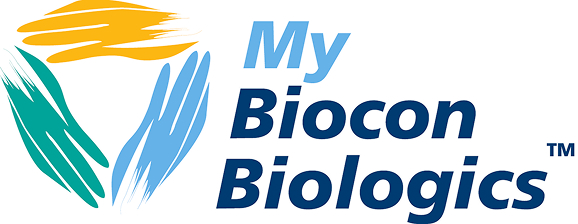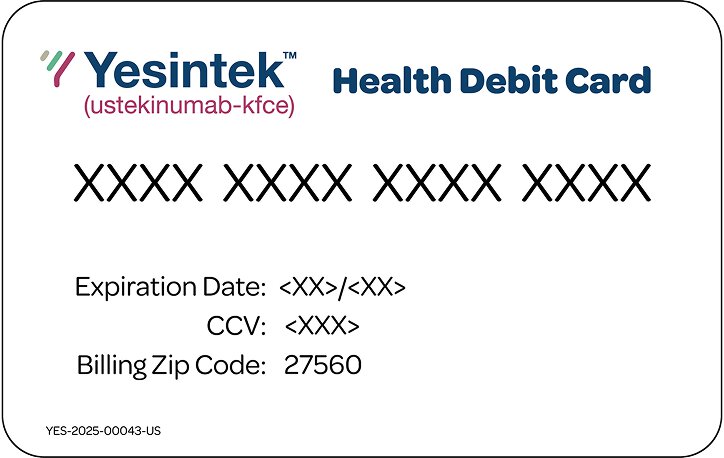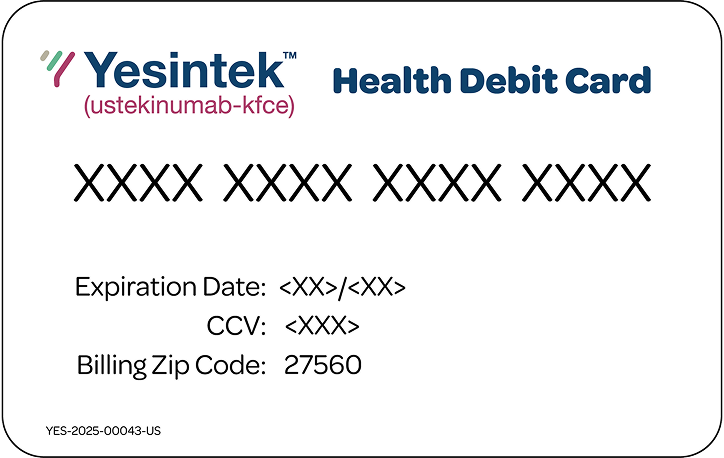Treatment support resources?YES
We’ve got services and tools to help you and your patients get the most out of Yesintek™



Patient Transition Program*
Offers existing Stelara® (ustekinumab) or other ustekinumab biosimilar patients a prepaid $250 Health Debit Card to help make the switch to YESINTEK (ustekinumab-kfce) as seamless as possible

IV Savings Program†
Gives eligible new patients savings up to $100 in out-of-pocket costs associated with the initial IV induction dose for gastrointestinal conditions


Patient Transition Program*
Offers existing Stelara® (ustekinumab) or other ustekinumab biosimilar patients a prepaid $250 Health Debit Card to help make the switch to YESINTEK (ustekinumab-kfce) as seamless as possible


IV Savings Program†
Gives eligible new patients savings up to $100 in out-of-pocket costs associated with the initial IV induction dose for gastrointestinal conditions

Benefits Investigation
Handles research of insurance coverage and patient cost-sharing, while providing a full summary of benefits

Quick Start Program‡
Provides a way for new patients to quickly begin therapy if the prior authorization or appeal process takes 5 days or longer

Prior Authorization Support
Helps you with verifying the enrollment status of your patient’s insurance plan

Bridge Program‡
Helps minimize authorization-related treatment delays for existing patients and deliver prescription to their door
The HCPCS Level II product code for YESINTEK is Q5100
*Eligibility restrictions apply. Available for patients transitioning from Stelara or other ustekinumab to YESINTEK. For full terms and conditions, visit www.Yesintek.com/patienttransitionprogram.
†Eligibility restrictions apply. Not valid for uninsured patients or patients who are covered by a state- or federally funded healthcare program. For full terms and conditions,
visit www.Yesintek.com/IVsavingsprogram.

Benefits Investigation
Handles research of insurance coverage and patient cost-sharing, while providing a full summary of benefits

Prior Authorization Support
Helps you with verifying the enrollment status of your patient’s insurance plan

Quick Start Program‡
Provides a way for new patients to quickly begin therapy if the prior authorization or appeal process takes 5 days or longer

Bridge Program‡
Helps minimize authorization-related treatment delays for existing patients and deliver prescription to their door
*Eligibility restrictions apply. For the Quick Start and Bridge Program terms and conditions, please visit www.YesintekHCP.com/bridgeprogramtermsandconditions.
†Eligibility restrictions apply. Not valid for uninsured patients or patients who are covered by a state- or federally funded healthcare program. For full terms and conditions, visit www.Yesintek.com/IVsavingsprogram.
The HCPCS Level II product code for YESINTEK is Q5100
*Eligibility restrictions apply. Available for patients transitioning from Stelara or other ustekinumab
to YESINTEK. For full terms and conditions, visit
www.Yesintek.com/patienttransitionprogram
†Eligibility restrictions apply. Not valid for uninsured patients or patients who are covered by a state- or federally funded healthcare program. For full terms and conditions, visit www.Yesintek.com/IVsavingsprogram.
‡Eligibility restrictions apply. For the Quick Start and Bridge Program terms and conditions, please visit www.YesintekHCP.com/bridgeprogramtermsandconditions.
Copay assistance§
We’ll help you identify and enroll your eligible patients who may pay as little as $0 in out-of-pocket costs.
§Eligibility restrictions apply. Not valid for uninsured patients or patients who are covered by a state- or federally funded healthcare program. For full terms and conditions, visit www.Yesintek.com/copay.

Physicians: download patient enrollment form.
Specialty pharmacists: enroll your patients.
Resources for your practice
Coding and Billing Guide
Provides you with information specific to the coding and administration of YESINTEK.
Enrollment Forms
Forms for getting your patients enrolled in the My Biocon Biologics support program.
Resources for your patient
Patient Brochure
A printable booklet with detailed product information to help your patient get familiar with YESINTEK.
Self-Injection Training
A step-by-step video tutorial on how to correctly use the YESINTEK prefilled syringe.
Restroom Access Overview
A resource outlining the law that gives your patient access to public restrooms when it’s most needed.
